The FreedomPlus by Centaur Caravans may look a little familiar. That’s because it has been on Australian roads for over 10 years. For a long time, it was known as the Karakampa.
Under the ownership of Centaur Products, a company with extensive experience creating fibreglass products, this van has become available in three different models: the entry-level Karakampa Series II, the mid-spec Tourer, and our review van, the top-end FreedomPlus.
Each of these vans is the same shape and size but come with different levels of standard equipment.
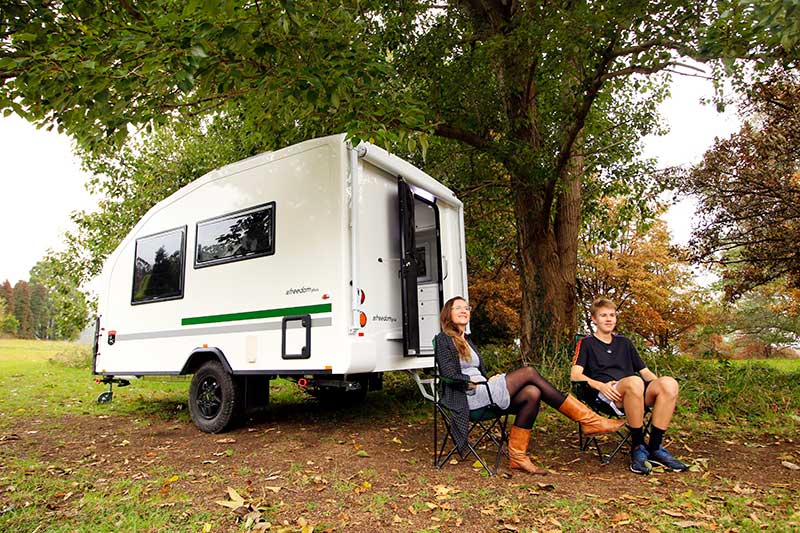 The company also builds the Karavané, which retains the profile of the other three vans in the Centaur line-up, but it’s about 1m longer and looks more like a ‘traditional’ caravan.
The company also builds the Karavané, which retains the profile of the other three vans in the Centaur line-up, but it’s about 1m longer and looks more like a ‘traditional’ caravan.
Arguably, the FreedomPlus and its stablemates have not received the attention they deserve among Australian RVers. With its clean lines, a moulded fibreglass shell, light weight and clever layout, the Freedom Plus is among the most unique rigs on our roads.
CENTAUR CARAVANS’ SEAMLESS EXTERIOR
Centaur Caravans builds its chassis inhouse. For this van, the chassis is comprised of 4in hot-dipped-galvanised RHS steel for the main members, with a 4in drawbar that stretches back to the Al-Ko Enduro Outback suspension. The FreedomPlus is a semi-offroader, built to handle undulations, unsealed national parks and the like. As such, it also comes with the Al-Ko offroad ball coupling, which offers 360 degrees of articulation on the horizontal and vertical axes.
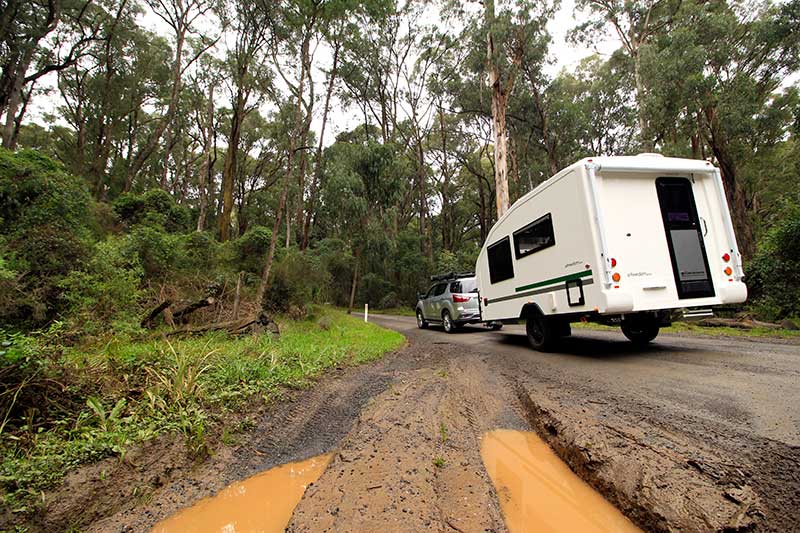 The body of the Centaur Caravans FreedomPlus is constructed from fibreglass sandwich panels. The one-piece, 30mm-thick walls are bonded to a 65mmm-thick one-piece fibreglass front, roof and rear section, while the floor is painted marine ply. The exterior is, in a word, seamless – the fibreglass work is immaculate to the eye.
The body of the Centaur Caravans FreedomPlus is constructed from fibreglass sandwich panels. The one-piece, 30mm-thick walls are bonded to a 65mmm-thick one-piece fibreglass front, roof and rear section, while the floor is painted marine ply. The exterior is, in a word, seamless – the fibreglass work is immaculate to the eye.
The drawbar supports two 4.5kg gas cylinders and the spare wheel. Behind these, you’ll find two locker doors, one either side of the van, which provide access to the marine-carpeted tunnel boot. The lower front section of the van is protected by a special ‘bra’, with elasticised loops keeping it in place. This storage space is augmented by a boot with a top lid.
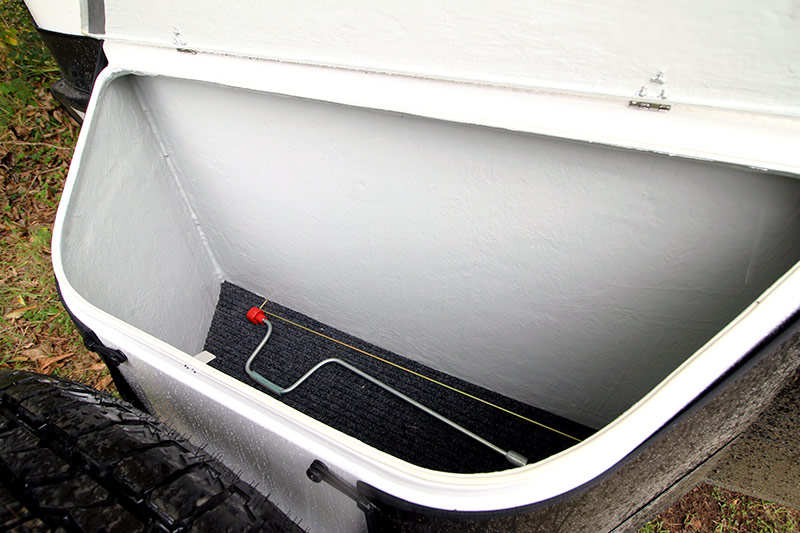 The FreedomPlus comes as standard with two 100Ah deep-cycle batteries, along with an Enerdrive controller for the dual 80W solar panels on the roof, and a lithium-ready Enerdrive ePower battery charger. This equipment is secured in an offside locker.
The FreedomPlus comes as standard with two 100Ah deep-cycle batteries, along with an Enerdrive controller for the dual 80W solar panels on the roof, and a lithium-ready Enerdrive ePower battery charger. This equipment is secured in an offside locker.
Externally, it’s fair to say that this van doesn’t offer a lot of facilities. With its rear-door entry, Centaur’s thinking is that you’ll relax at the back of the van – hence the rear awning. However, an external 12V point and perhaps a 240V point would be appreciated (perhaps on the nearside), and a fold-out picnic table wouldn’t go astray either.
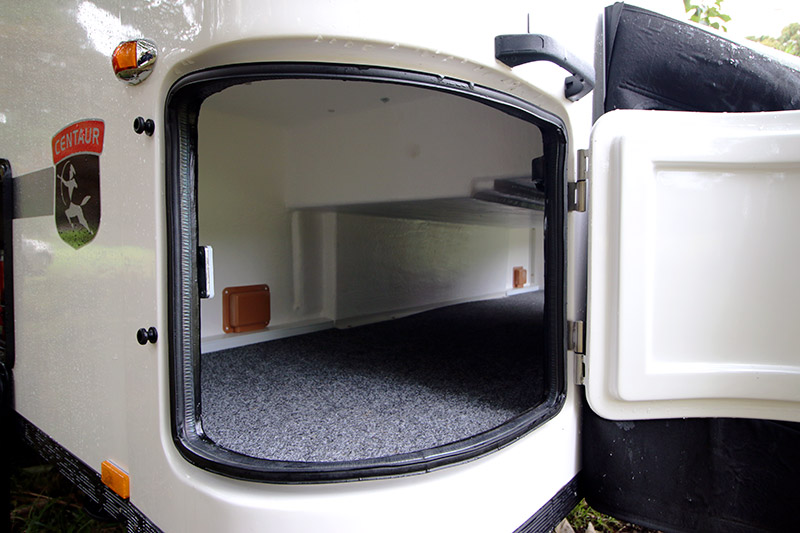 Though it has a reasonable 12V system, I don’t view this van as a long-term free-camping machine. With its freshwater storage capacity of 82L, it offers perhaps two days away from town water, so as you explore Australia, you might spend a night or two offgrid between destinations or holiday parks – and there’s nothing wrong with that!
Though it has a reasonable 12V system, I don’t view this van as a long-term free-camping machine. With its freshwater storage capacity of 82L, it offers perhaps two days away from town water, so as you explore Australia, you might spend a night or two offgrid between destinations or holiday parks – and there’s nothing wrong with that!
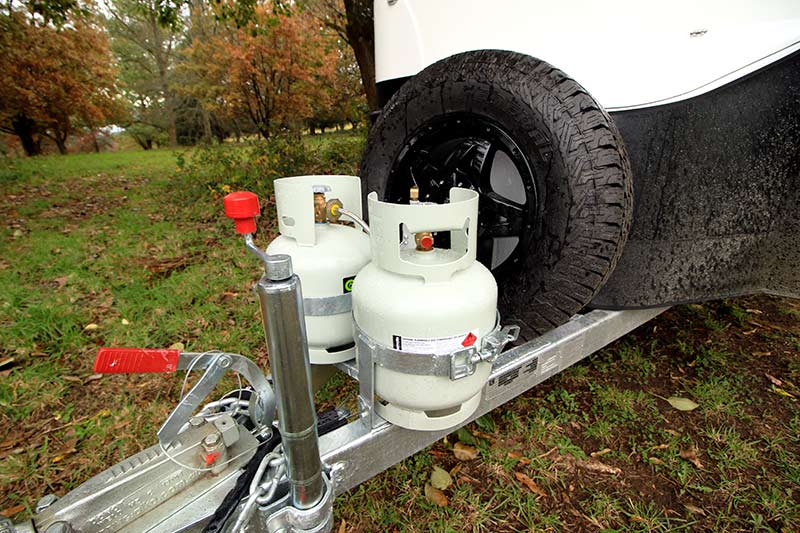 A key feature of the Centaur Caravans FreedomPlus is its light weight. The model we towed across various terrain types had a Tare of 1560kg and an ATM of 2100kg, giving it a very generous payload capacity of 540kg, making it suitable for a wide range of potential tow vehicles. I might add that it was a pleasure to tow and the compact nature of the van made it particularly manoeuvrable in tight situations.
A key feature of the Centaur Caravans FreedomPlus is its light weight. The model we towed across various terrain types had a Tare of 1560kg and an ATM of 2100kg, giving it a very generous payload capacity of 540kg, making it suitable for a wide range of potential tow vehicles. I might add that it was a pleasure to tow and the compact nature of the van made it particularly manoeuvrable in tight situations.
FIBREGLASS INTERIOR
Stepping up the fold-out step and through the rear door, I was immediately impressed by the interior of the FreedomPlus. There is something almost marine-like about this van, with its moulded fibreglass overhead lockers and cabinetry, and the durable boat cabin liner used on the roof and some of the fibreglass walls.
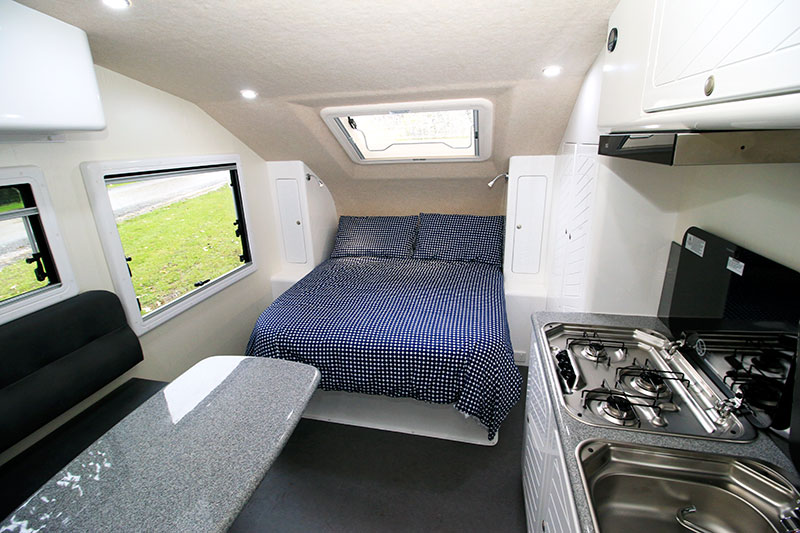 The Centaur Caravans FreedomPlus has an interior length of only 4.1m, yet it fits in so much without feeling cramped, that it all somehow feels larger than it actually is.
The Centaur Caravans FreedomPlus has an interior length of only 4.1m, yet it fits in so much without feeling cramped, that it all somehow feels larger than it actually is.
A kitchen with a large benchtop stretches across the offside of the van. It includes a three-burner gas cooktop, a small sink, and a 108L Dometic compressor fridge-freezer. At the rear end of the bench, you’ll find a small control panel that includes the water level indicator, a 12V point, the power and antenna connection for an optional 12V TV, and more.
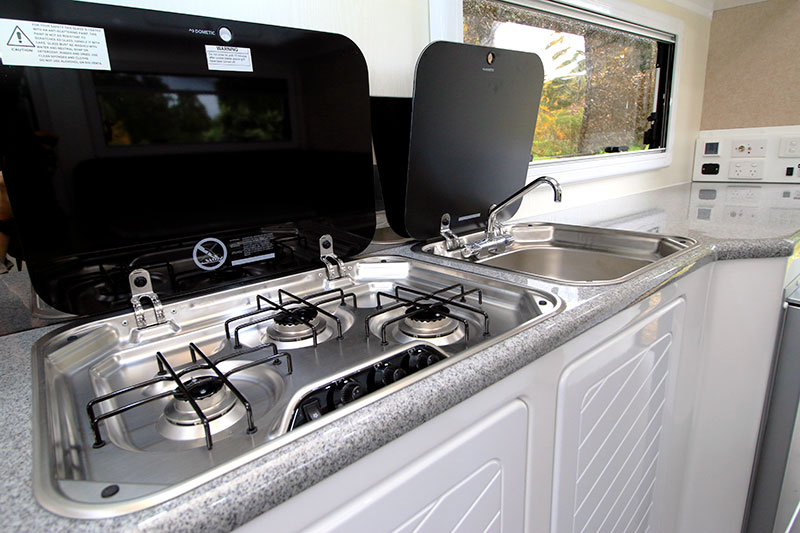 The onboard bathroom, tucked into the rear nearside corner behind a fibreglass door, is a highlight. It’s all fibreglass, of course, with the only join (at the top) neatly sealed with silicone. This shower is not going to leak. A 12V fan hatch, hand-held shower rose and washbasin are included.
The onboard bathroom, tucked into the rear nearside corner behind a fibreglass door, is a highlight. It’s all fibreglass, of course, with the only join (at the top) neatly sealed with silicone. This shower is not going to leak. A 12V fan hatch, hand-held shower rose and washbasin are included.
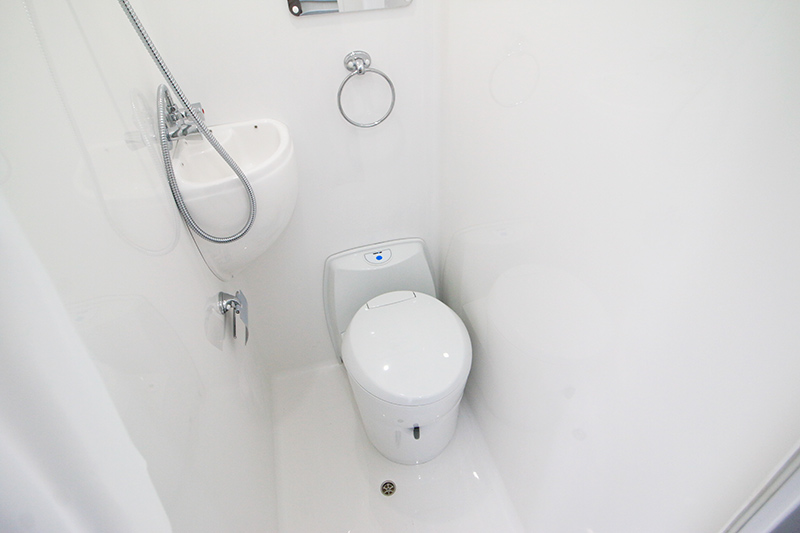 The rest of the layout is comprised of an L-shaped dinette and a forward bed. Honestly, what more do you need? I was impressed with the amount of storage space on offer, the quality of the fibreglass and overall seamlessness of it all. If I was to criticise anything, it would be the lack of 12V points provided as standard. I’d love to see one either side of the bed (there are 240V points here though) and a 12V/240V point in the legwell of the dinette – you can option in some USB points, however.
The rest of the layout is comprised of an L-shaped dinette and a forward bed. Honestly, what more do you need? I was impressed with the amount of storage space on offer, the quality of the fibreglass and overall seamlessness of it all. If I was to criticise anything, it would be the lack of 12V points provided as standard. I’d love to see one either side of the bed (there are 240V points here though) and a 12V/240V point in the legwell of the dinette – you can option in some USB points, however.
My other point of criticism is that while the lockers look great on the outside, the insides look a little unfinished here and there.
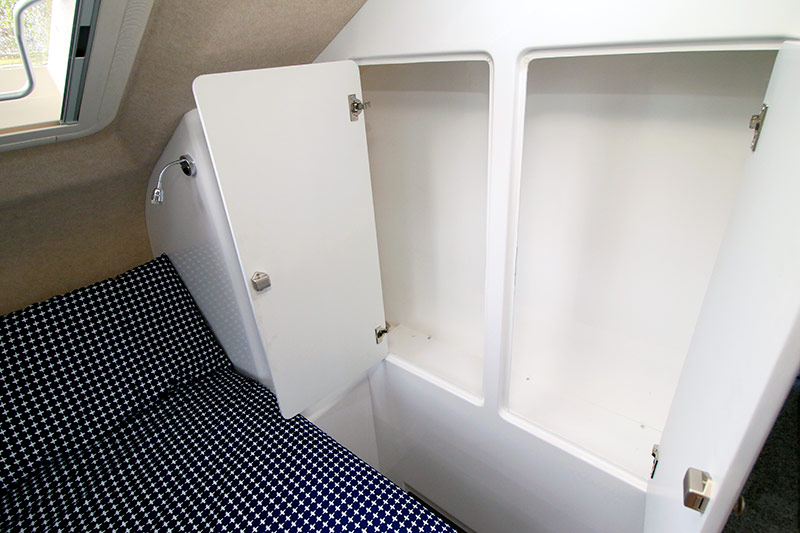 The double bed, which sits on a fibreglass base, measures 1.87×1.34m. Naturally, the bed base lifts on gas struts to reveal a large storage area, and I liked that the bed is kept closed by a special catch – you don’t see that on your typical caravan.
The double bed, which sits on a fibreglass base, measures 1.87×1.34m. Naturally, the bed base lifts on gas struts to reveal a large storage area, and I liked that the bed is kept closed by a special catch – you don’t see that on your typical caravan.
Of course, you can option in other features, such as a microwave. But in standard form, the interior has most bases covered – there’s even a reverse-cycle air-conditioner.
It really is a unique van, with a layout that should work very well for couples. I suspect that when your neighbours at the holiday park ask for the grand tour, they’ll be impressed.
GORV’S VERDICT
It’s light, manoeuvrable, easy to hitch up and tow. The tough fibreglass construction, which also ‘flows’ throughout the interior, is also great from a longevity standpoint – aside from a few shelves inside the cupboards, there’s no timber to rot if exposed to water. And inside and out, the FreedomPlus by Centaur Caravans should prove exceptionally easy to clean.
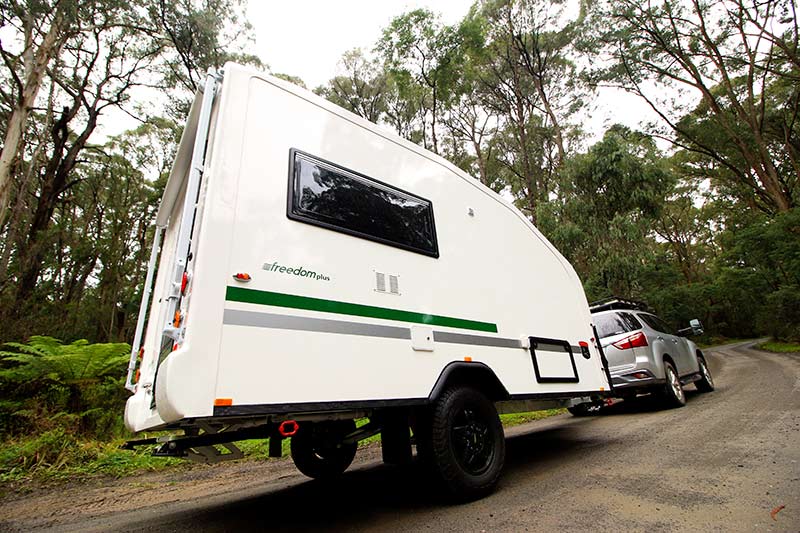 I like this rig not only because it is so different from what we usually see in the Australian RV market, but because it offers a comfortable living space without compromising on the main comforts expected in a modern caravan. If you’ve not seen it before, check it out.
I like this rig not only because it is so different from what we usually see in the Australian RV market, but because it offers a comfortable living space without compromising on the main comforts expected in a modern caravan. If you’ve not seen it before, check it out.
THE SCORE
FIT AND FINISH – 
LAYOUT – 
INNOVATION – 
HITS & MISSES
COMPLETE SPECS
Overall length: 5.9m
External body length: 4.5m
External width: 2.4m
Travel height: 2.95m
Tare: 1560kg
ATM: 2100kg
Unladen ball weight: 120kg
Group axle rating: 2000kg
Construction: Fibreglass sandwich panel walls; one-piece fibreglass front, roof and rear
Coupling: Al-Ko offroad ball
Chassis: 4in hot-dipped galvanised with 4in drawbar
Suspension: Al-Ko Enduro Outback independent coil
Brakes: Al-Ko electric
Wheels: 16in alloy
Fresh water: 1x82L
Grey water: 1x62L
Awning: Roll-out (rear_
Battery: 2x100Ah deep-cycle
Solar: 2x80W
Air-conditioner: Reverse-cycle
Heater: Truma gas
Gas: 2x9kg
Sway control: No
Cooking: Swift three-burner cooktop with griller and oven
Refrigeration: 108 Dometic compressor
Microwave: Yes
Bathroom: Combo unit with shower and cassette toilet
Washing machine: No
Lighting: 12V LED
Hot water: Truma gas/electric
$58,000 (including GST)


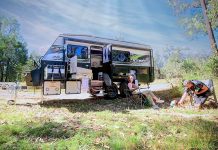
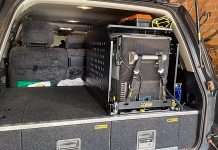
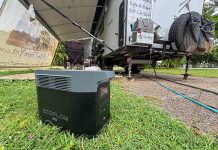

Good review we have had this van for 2.5 years and happily spend 4 weeks off grid each year at cape range Exmouth 200 watt panels on roof and 200 portable sola supplies power to 2 /120 amp lithium batteries with a 2000amp inverta. Trip to town once a week for water and washing clothes etc.
Van tows very well and the kitchen bench space is more than most 20ft plus vans.